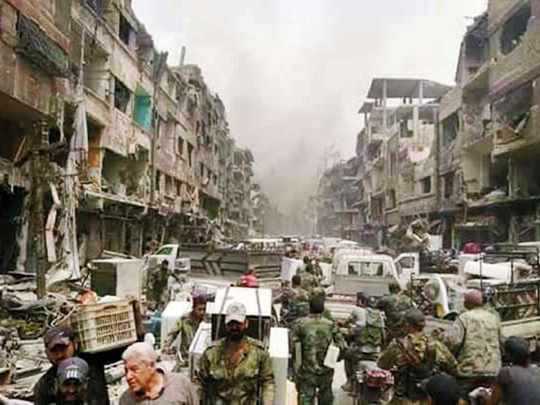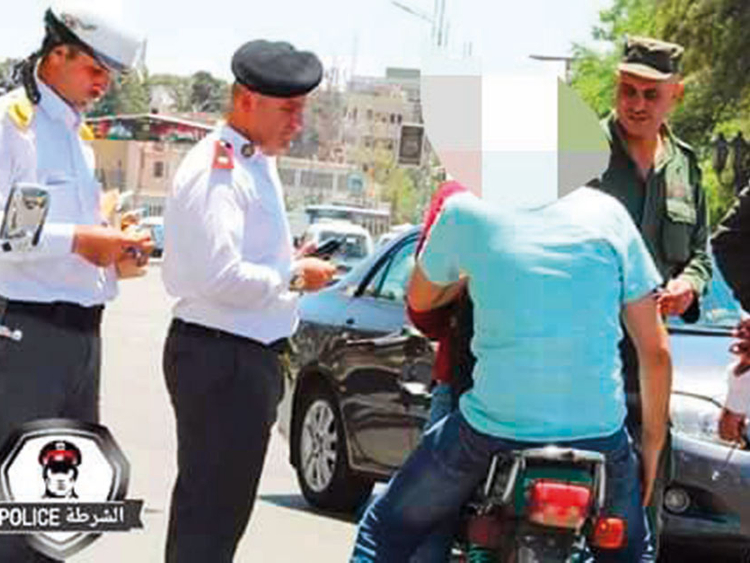
Damascus: After seven years of wars, the Syrian government is attempting to restore ‘civility and normalcy’ to the city by cracking down on violent gangs and mafias that have been able to take advantage of the ensuing chaos from the war.
Now that major military battles against rebels across the country are largely over, civil forces can now turn their attention on those who sought to take advantage of the security vacuum in the country.
Joint patrols of military and traffic police have been recently dispatched to the streets of the Syrian capital with the mandate to arrest civilians wearing military fatigues.
Standing nearby, although not always visible, are Russian soldiers watching and observing in silence.
Since January 2018, the Syrian government began a campaign to disband local militias.
Many of the forces in these groups were irregular soldiers originally trained by Iran to supplement government troops—who were fighting elsewhere—to man checkpoints and conduct low-scale operations.
The irregular soldiers were grouped into many divisions including the National Defence Forces, Al Bustan Forces and the Baath Phalange.
The exact number of these soldiers is unknown but some rough estimates count around 250,000 men.
These ‘militiamen’ have been able to roam the streets of Damascus, armed to the teeth usually with shaved heads and long beards.
The government now is giving them a choice: either enlist in the official army or surrender their arms and return to civilian life.
The thugs became a serious nuisance to many residents as they were able to loot and kidnap at will, extorting ordinary families for ransom money.
Many police stations closed down during the course of the conflict, allowing these militiamen to have a free rein in the city.
They could be seen firing their guns in the air to break up traffic jams in order to pass through—often driving against the flow of traffic.
In 2013-2016, they profiteered from selling heating fuel at black market prices, and in January 2017, gallons of water during a crippling water crisis that held the Damascenes by the throat, resulting, at the time, from battles at the Ain Al Fija Spring near the Syrian capital.
Those stationed at checkpoints at the entrance of markets would charge cargo vans with transit fees, up to 300 Syrian pounds.
On the eve of Eid, a handful of these checkpoints were dismantled, throughout the neighbourhoods of Al Adawi and Al Tijara and at important junctions in Khalid Ibn Al Walid Street and the ancient Midhat Pasha Market.
The Damascus Countryside Governorate issued a statement saying that 90 per cent of checkpoints will be brought down within the upcoming period, because of improved security.
For militiamen manning these checkpoints it will mark an end to a very profitable goldmine.
The backlash of the militiamen against the crackdown has been fierce.
One Iraqi militiaman, from the Abu Al Fadel Al Abbas Phalange, was locked up by Syrian authorities after delivering an animated monologue in Damascus which was caught on video.
In the clip fraught with sectarian language, the man threatens to “burn the city and those within it”.
In addition to dismantling checkpoints, the government has begun confiscating all motorbikes from the streets.
Technically, motorbikes are illegal having been banned in the 1980s because they were used predominately by the Muslim Brotherhood in military operations against the regime.
However, thousands have mushroomed in the capital in recent years, as a way to get around horrible traffic jams caused by security checkpoints.
They were also used by the militias to transport refrigerators, washing machines, and televisions out of looted homes.
The proliferation of these bikes has also caused a surge in traffic accidents.
Esmail Al Khatib, a doctor at the Al Mouwasat Hospital tells Gulf News at least 400 people have died this year alone in motorbike-related accidents.
At least 300 motorbikes have been confiscated since last week—it is estimated that there are around 1,300 in Damascus alone.
Many scuffles have erupted between the militiamen and security officers.
Abdul Jawad Saleh, a policeman from the Mezzeh neighbourhood, told Gulf News: “Me and six colleagues tried to confiscate one man’s bike. He took out his loaded gun and threatened to kill me. After we arrested him he vowed to kill us the minute he got out of jail.”













